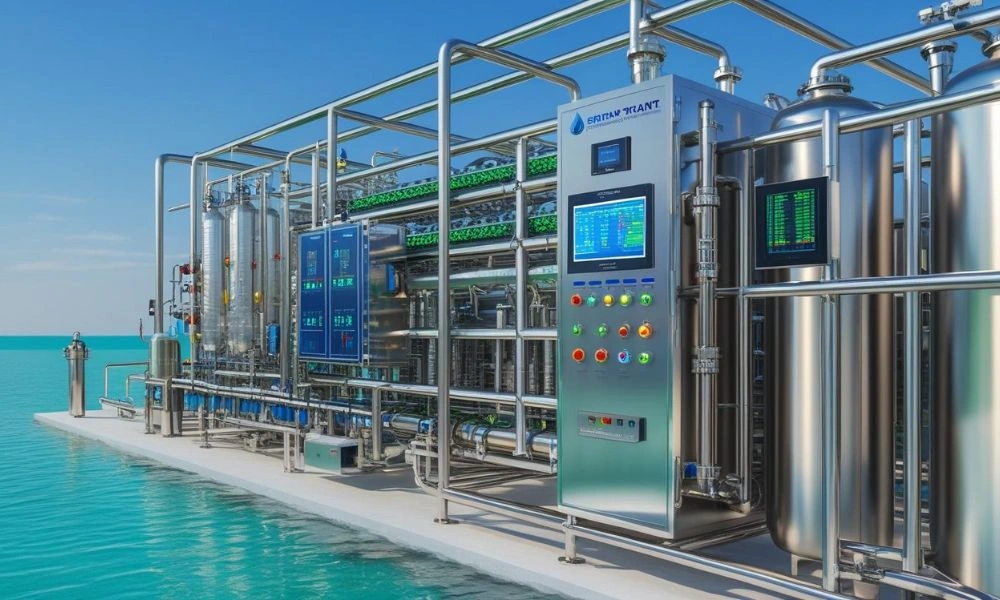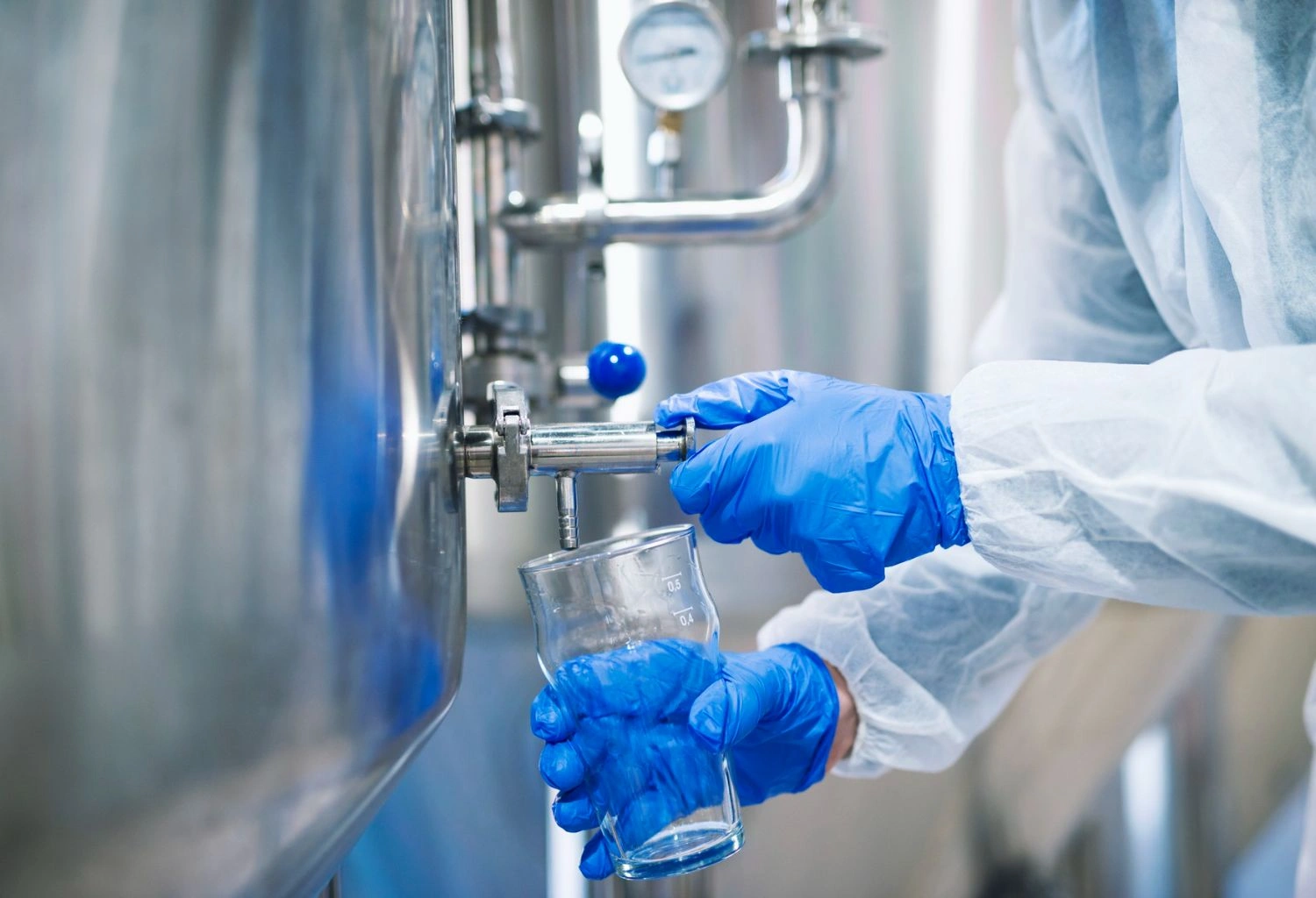Water Care Services Pakistan (WCSP) is a pioneer in desalination by reverse osmosis, offering advanced, energy-efficient, and sustainable water treatment systems. Serving diverse industries, WCSP designs customized RO solutions that ensure water security and environmental protection across Pakistan. Their commitment to innovation makes them the top choice for RO desalination.
Ultra-filtration Water Plant
Why Is WCSP a Leader in Desalination through Reverse Osmosis?
Water Care Services Pakistan (WCSP) is a name that has become synonymous with water treatment. It is recognized for providing effective and sustainable water purification technology. WCSP is at the forefront of desalination using reverse osmosis. It is particularly important in a nation like Pakistan, where water scarcity is becoming an alarming problem. Their state-of-the-art RO-based systems are providing timely and sustainable solutions to industrial, municipal, and commercial water requirements.
How Does Reverse Osmosis Work?
The basis of WCSP’s desalination facilities is reverse osmosis, which is a membrane technology that filters out salts, minerals, and other contaminants from seawater or brackish water. The technology uses pressure to force water through a semi-permeable membrane, leaving the clean water behind and concentrating the dissolved salts and impurities.
Reverse osmosis-based desalination is effective because:
- It can filter out up to 99% of total dissolved solids (TDS)
- It is chemical-free and more environmentally friendly compared to conventional processes
- It’s scalable, right from small to industrial scale
- It delivers very high-quality water consistently
The process is paramount in addressing the water crisis in Pakistan and forms the basis of WCSP’s systems.
Why Is Desalination Important in Pakistan?
Pakistan is standing at the brink of a serious water crisis with per capita availability dwindling annually. The imminent crisis would hit agriculture, industry, power, and public health. Reverse osmosis desalination provides a stable supply of freshwater from the nation’s unexploited saline water resources.
WCSP’s RO plants aim to offer water independence to industries, particularly in coastal regions where seawater is readily available but yet to be treated. Through the conversion of unusable water into a precious commodity, WCSP is contributing to national initiatives toward sustainable water management.
What Makes WCSP Unique in RO Desalination?
As opposed to standard water treatment firms, WCSP provides tailor-made engineered desalination by reverse osmosis systems. These systems are:
- Constructed using high-efficiency membranes
- Installed with pre-treatment modules for conditioning of raw water
- Paired with energy recovery units to reduce operating expenses
- Built for long-term performance and low maintenance requirements
WCSP is also focused on making sure every project meets ISO requirements and local water quality standards. Their in-house group of water engineers, technicians, and project managers provide solutions that exceed industry players in terms of quality and efficiency.
Who Utilizes WCSP’s Desalination through Reverse Osmosis Solutions?
WCSP provides customers from a wide variety of industries that require pure water for some purpose or another:
1. Garment and Textile Industry
Water is used in dyeing, washing, and finishing operations. RO makes sure the water is hardness-free, chlorine-free, and free of other contaminants that may ruin fabrics or quality.
2. Pharmaceuticals and Healthcare
Clean water is needed in drug formulation, sterilization, and equipment cleaning. WCSP’s RO systems are designed to adhere to high standards of purity.
3. Food & Beverage Production
Water in foods and beverages has to be of high hygiene. RO delivers microbiologically pure water without affecting taste.
4. Power Plants
Soft, mineral-free water is needed for turbines, boilers, and cooling towers. RO avoids scaling and enhances energy efficiency.
5. Agriculture
Desalination water is applied to irrigate saline-prone fields, enhancing crop output and soil rehabilitation.
All sectors served by WCSP enjoy less municipal water dependency, optimized production, and environmental compliance.
What Technologies Make WCSP’s RO Systems Better?
WCSP extends RO system capabilities beyond normal systems through the integration of additional cutting-edge water treatment technologies. This combined technology increases performance, recovery, and equipment lifespan:
Bioremediation:
Applied in pre-treatment to biologically degrade organic contaminants, lowering fouling on RO membranes.
Advanced Oxidation Process (AOP):
Destroys persistent organic molecules with ozone, hydrogen peroxide, and UV—suitable for treating industrial wastewater prior to RO.
Electrocoagulation:
Removes heavy metals, oil, and emulsified solids through electrochemical reactions, reducing the dosing of chemicals.
Electrocoagulation
Moving Bed Biofilm Reactor (MBBR):
Facilitates biological treatment by providing high surface area for microbes, hence pre-treatment becomes effective for high flows.
Such technologies coupled with desalination through reverse osmosis render WCSP’s systems stronger, energy-efficient, and sustainable.
How WCSP Designs Cost-Effective RO Systems?
Desalination has been criticized at times as energy-intensive. WCSP responds by:
- Using energy recovery devices that recycle pressure from the concentrate stream
- Providing low-pressure membranes that lower power requirements
- Featuring smart flow and pressure sensors for cost-effective operation
- Employing variable-frequency drive (VFD) pumps to vary flow as needed
Through these measures, WCSP’s reverse osmosis desalination plants save up to 60% in operating costs over the long run, making them viable even for small industries and municipal supply.
Conclusion
Water shortage is no longer a future threat—it’s an everyday reality. With the increasing demand for fresh water, desalination through reverse osmosis is the most viable option. WCSP, with its experience, certified practices, and eco-friendly technologies, is definitely a leader in this field. Their RO desalination plants are not only effective but also eco-friendly, making water accessible for generations to come.
Frequently Asked Questions (FAQs)
1. What is reverse osmosis and how does it work?
Reverse osmosis (RO) is a membrane filtration process that removes salts, minerals, and impurities from water by forcing it through a semi-permeable membrane using pressure.
2. Why is desalination important for Pakistan?
Due to severe water scarcity, desalination provides a reliable alternative by converting seawater and brackish water into usable freshwater for industries, agriculture, and urban areas.
3. What makes WCSP a leader in reverse osmosis desalination?
WCSP offers ISO-certified, energy-efficient, and fully customized RO systems, backed by expert engineering, local insight, and innovative technology integration.
4. Which industries use WCSP’s RO desalination systems?
Industries served include textiles, pharmaceuticals, food & beverage, power plants, and agriculture, all requiring high-quality, mineral-free water.
5. How does WCSP ensure energy efficiency in RO plants?
They use energy recovery devices, low-pressure membranes, VFD pumps, and smart sensors to reduce energy usage and operating costs by up to 60%.
6. What additional technologies are integrated with WCSP’s RO systems?
Technologies include Bioremediation, Advanced Oxidation Process (AOP), Electrocoagulation, and Moving Bed Biofilm Reactor (MBBR) for enhanced pre-treatment and efficiency.
7. Is reverse osmosis better than conventional water treatment?
Yes, RO removes up to 99% of total dissolved solids without chemicals, offering high-purity water suitable for
sensitive and industrial-grade applications.
8. Can WCSP’s RO systems be scaled for small or large operations?
Absolutely. WCSP designs modular systems adaptable for small businesses, communities, and large-scale industrial or municipal water needs.
9. Are WCSP’s desalination systems compliant with local standards?
Yes, all WCSP solutions meet Pakistan’s NEQS and international ISO water quality and environmental standards.
10. How does WCSP support its desalination clients post-installation?
They provide 24/7 technical assistance, Annual Maintenance Contracts (AMCs), system upgrades, and performance monitoring to ensure long-term reliability and efficiency.



